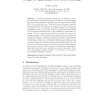Free Online Productivity Tools
i2Speak
i2Symbol
i2OCR
iTex2Img
iWeb2Print
iWeb2Shot
i2Type
iPdf2Split
iPdf2Merge
i2Bopomofo
i2Arabic
i2Style
i2Image
i2PDF
iLatex2Rtf
Sci2ools
133
click to vote
CSL
2001
Springer
2001
Springer
A Logic for Approximate First-Order Reasoning
Abstract. In classical approaches to knowledge representation, reasoners are assumed to derive all the logical consequences of their knowledge base. As a result, reasoning in the first-order case is only semi-decidable. Even in the restricted case of finite universes of discourse, reasoning remains inherently intractable, as the reasoner has to deal with two independent sources of complexity: unbounded chaining and unbounded quantification. The purpose of this study is to handle these difficulties in a logic-oriented framework based on the paradigm of approximate reasoning. The logic is semantically founded on the notion of resource, an accuracy measure, which controls at the same time the two barriers of complexity. Moreover, a stepwise technique is included for improving approximations. Finally, both sound approximations and complete ones are covered. Based on the logic, we develop an approximation algorithm with a simple modification of classical instance-based theorem provers. ...
Related Content
| Added | 28 Jul 2010 |
| Updated | 28 Jul 2010 |
| Type | Conference |
| Year | 2001 |
| Where | CSL |
| Authors | Frédéric Koriche |
Comments (0)

